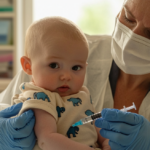
Jak długo dziecko może nie jeść podczas choroby?
Spis treści:
Choroba i osłabienie organizmu
Dzieci, szczególnie w pierwszym roku uczęszczania do placówek oświatowych, mogą często chorować. Powodów jest wiele:
- Nie całkiem ukształtowany układ odpornościowy, nabywanie odporności dopiero po kontakcie z wirusami / bakteriami lub po przechorowaniu danej infekcji.
- Pierwszy kontakt z licznymi patogenami, bo życiu w zamkniętym kręgu towarzyskim i środowisku rodzinnym.
- Na skutek zgromadzenia wielu osób na małej powierzchni, często w zamkniętych pomieszczeniach, dzieci są narażone na choroby zakaźne (np. ospa), ponieważ nie mają jeszcze wszystkich szczepień.
- Niezachowanie zasad higieny, wkładanie do ust rąk, przedmiotów czy piasku.
- Przyprowadzanie przez rodziców dzieci z objawami infekcji, która szybko przenosi się na inne dzieci.
Najczęstsze infekcje to przeziębienia, powodowane przez wirusy infekcje grypowe i grypopodobne i dolegliwości ze strony układu pokarmowego, będące skutkiem zakażeń m.in. rotawirusami.
Objawy przeziębień i innych infekcji u dzieci to: osłabienie, senność, apatia, marudzenie, zmęczenie, zaczerwienienie oczu, zapalenie spojówek, katar, kaszel, bóle mięśni, bóle stawów, utrata apetytu, bóle gardła, bóle uszu, podwyższona temperatura, dolegliwości pokarmowe.
Brak apetytu podczas choroby
Wiele dzieci i dorosłych w czasie infekcji nie odczuwa głodu. Chore dzieci mogą odmawiać jedzenia, a także picia. Czy to normalny objaw? Warto pamiętać, że gdy przeziębione dziecko nie chce jeść, może powodować to dodatkowe komplikacje: odwodnienie organizmu czy pogłębiające się osłabienie, a nawet dalsze upośledzenie odporności i w konsekwencji przedłużenie infekcji.
Zazwyczaj w czasie infekcji niewiele dzieci ma apetyt. Przeszkodą może być opuchnięte i bolące gardło, męczący kaszel lub sensacje żołądkowe towarzyszące niektórym infekcjom. Czasami przy problemach żołądkowych i infekcjach z objawami ze strony układu pokarmowego zaleca się głodówkę lub dietę płynną.
Jak zachęcić dziecko do jedzenia w czasie choroby?
Gdy chore dziecko nie chce jeść, warto sprawdzić, jaka jest tego przyczyna. Czasem dziecko nie chce jeść, ponieważ boli je brzuch, odczuwa mdłości, nudności lub ból gardła przy przełykaniu. Jeśli zminimalizujemy ból, samopoczucie dziecka może się poprawić i wróci apetyt.
Co zrobić, jeśli maluch stanowczo odmawia posiłku? Jak długo dziecko może nie jeść podczas choroby? Ponieważ dzieci szybko się odwadniają, nie wolno pozwolić na niepicie, ale także przegłodzenie chorego dziecka nie jest właściwe. Dobrze dobrane menu pozwala szybciej wrócić do zdrowia. Podwyższona temperatura zwiększa zapotrzebowanie organizmu na kalorie, a przede wszystkim na białka, które są niezbędne do prawidłowej pracy układu odpornościowego.
Gdy dziecko nie chce jeść podczas choroby, możemy zachęcić je np.:
- serwując ulubione dania,
- miksując posiłki, aby ułatwić przełykanie,
- podawać dania o konsystencji płynnej, np. zupy, pożywne koktajle, jogurty (które zawierają cenne bakterie probiotyczne),
- podając małe porcje, aby nie przedłużać jedzenia, gdy dziecko woli poleżeć. Małe porcje nie obciążają małego brzuszka,
- serwując posiłki lekkostrawne, z którymi organizm łatwiej sobie poradzi i nie będzie tracić energii na trawienie, np. chude gotowane mięso z warzywami,
- przygotowując kolorowe posiłki – owoce i warzywa. Im więcej barw na talerzu, tym więcej witamin! Mowa oczywiście o naturalnych produktach, a nie sztucznie barwionej żywności,
- podając probiotyki, które korzystnie wpływają na zdrowie i na trawienie. Są niezbędne w czasie infekcji, a szczególnie podczas antybiotykoterapii,
- podając duże ilości wody, która nawadnia, odżywia.
Jak długo dziecko może nie jeść podczas choroby?
Kilkudniowe ograniczenie jedzenia nie spowoduje dużych zaburzeń w odżywianiu. Należy jednak rygorystycznie przestrzegać, by dziecko w tym czasie przyjmowało płyny – zarówno gorączka, jak i wymioty czy biegunka bardzo odwadniają organizm. Wpływa to na pogorszenie przebiegu choroby i może być groźne dla zdrowia. Zwykle apetyt wraca wraz z poprawą samopoczucia, jednak bez właściwego odżywiania proces zdrowienia może się przedłużać. Dlatego gdy dziecko nic nie je podczas choroby, wielu rodziców odczuwa zrozumiały niepokój.
‒ Uważa się, że maksymalny czas, kiedy dziecko może nie jeść, to trzy dni. Jednak musi cały czas pić płyny, wodę, herbatę lub mleko matki, jeśli jest karmione piersią. Konieczne jest obserwowanie malucha, aby zauważyć oznaki odwodnienia, którego objawami są: wzmożona senność, apatia, brak oddawania moczu, sucha pieluszka, brak łez przy płaczu, zapadnięte gałki oczne, zapadnięte ciemiączko, suchość błon śluzowych i suchość skóry, która nie wraca do poprzedniego stanu po lekkim ściśnięciu lub uszczypnięciu, ponieważ nie jest elastyczna – wyjaśnia Anka Jankowska, opiekunka dziecięca w żłobku, certyfikowana opiekunka medyczna.
Gdy chore dziecko nie chce jeść, warto odwiedzić lekarza (lub umówić wizytę domową), ponieważ może to pogorszyć jego stan. Czasem, gdy dziecko chore nie chce jeść, niezbędna okazuje się hospitalizacja i zaaplikowanie kroplówek. Lekarza warto odwiedzić także wtedy, gdy dziecko nie chce jeść po chorobie. By ustalić przyczynę, może on zlecić wykonanie podstawowych badań krwi i moczu. Niekiedy konieczne może być wdrożenie dodatkowej suplementacji, podawanie witamin i minerałów, które wzmocnią organizm, co wpłynie na poprawę apetytu.






































